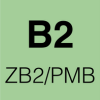German exam B1 – the joint project of ÖSD & Goethe
Together with the Goethe-Institut and the Learning and Research Centre of the University of Fribourg / Switzerland, the ÖSD has developed the German exam ‘ÖSD Zertifikat B1’. In four individual modules, young people and adults are tested to see whether they are at the level of independent language use.
Ongoing cooperation between ÖSD and Goethe for the B1 German exam
The B1 certificate has been offered by both institutions since 2013. In order to ensure that these B1 German exams test the relevant language level in a standardised manner, the ÖSD continues to work in close cooperation with the Goethe-Institut. All new examination sets are developed jointly by both examination providers.
ÖSD Zertifikat B1: more opportunities for integration & career
The B1 German exam developed jointly by ÖSD and Goethe is an officially recognised examination certificate that officially confirms the first step towards independent language use. Proof of German language skills at level B1 is often necessary, especially for work or permanent living in Switzerland, Germany or Austria.
Easier access to the German-speaking labour market
In the German-speaking labour market, B1 German language skills are indispensable in many professions. It opens doors to better job chances and makes everyday working life much easier. Those who master the language can avoid misunderstandings and integrate more quickly into work processes. This is why the German exam from the recognised examination providers ÖSD and Goethe is a valuable addition to all application documents.
Residence permits and better integration
German language skills at level B1 help immigrants and refugees in general to communicate independently and thus actively participate in social life in their new country.
In addition, the B1 German examination jointly organised by ÖSD and Goethe is a basic requirement for a valid residence permit in certain cases: For example, for Swiss citizenship, it is necessary to prove oral German language skills at level B1. And a recognised B1 certificate is also required for naturalisation in Germany.
Good knowledge of German for leisure activities and travelling
In addition, with an independent knowledge of German, you can enjoy films, books and music in the original and experience the culture of German-speaking countries in a completely new way.
But language level B1 also offers many advantages when travelling. Whether you’re ordering food in a restaurant, asking for directions or getting to know new people and their culture – with B1 knowledge, you can communicate confidently and self-assuredly.
Advantages and contents of the German B1 exam at a glance
In addition to the language requirements, it is just as important for the ÖSD and Goethe to take the perspective of German learners into account when working together.
Modular design – customised progress and flexibility
Because we know that learners make different levels of progress when practising German, we have designed the ÖSD Zertifikat B1 in modules. The German exam is divided into four separate modules: Reading, Listening, Writing and Speaking. This allows participants to decide for themselves which modules they want to take at any given time and which they do not. As soon as they pass a section, they receive a certificate for the respective module.
After the first exam, you then have a whole year to successfully complete all modules and obtain the ÖSD overall certificate. This allows German learners to fully focus on their individual learning progress.
Focus on realistic topics and practical skills
As with all exams from the two examination providers ÖSD and Goethe, the B1 German exam focuses on realistic topics that you may encounter in everyday or professional life.
- Reading module: With the help of several texts, reading comprehension is tested through five different tasks. In addition to multiple-choice questions, there are other tasks in which, for example, situations are to be correctly assigned or the understanding of different opinions and arguments is tested. In general, candidates at language level B1 can understand texts in which familiar everyday or professional language is used.
- Listening module: The Listening module tests whether participants can understand familiar topics from work, school or leisure when spoken clearly and slowly. Four tasks are set to test how well participants can understand the main and detailed information in the audio examples.
- Writing module: In the Writing module, two tasks test whether you can write independently about familiar everyday topics at an independent language level. Participants should show that they can describe and justify something and express their opinion on a given topic.
- Speaking module: Can German learners speak spontaneously and independently in coherent sentences and exchange ideas with others? Do they use correct grammar and a vocabulary that corresponds to level B1 when speaking? If so, then they are ready for the oral examination. In the first part of the B1 German exam, a dialogue is conducted with another candidate. The second and third parts are followed by a topic presentation and a final question and answer session.
ÖSD ZertifikatB1 for teenagers and adults
In co-operation with the Goethe-Institut, the ÖSD has created two exam versions depending on age: There is a special youth version for participants aged 12 to 16. The version for adults is offered from the age of 16. Both exam versions follow the same format, but focus on different topics. While the youth version focusses on content aspects such as school, leisure and youth culture, the adult version focuses on topics such as everyday life and work.
Incidentally, the ÖSD Zertifikat B1 can also be taken online. Since the beginning of 2024, the ÖSD has been offering its German exams both in paper form and as an online computer exam.




